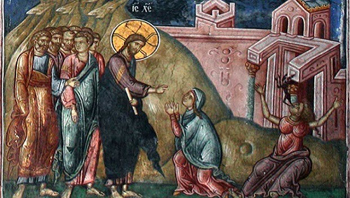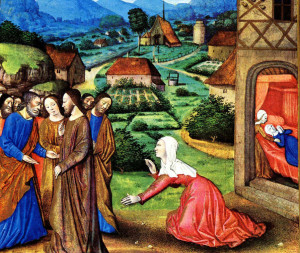For Sunday August 16, 2020
Lectionary Readings (Revised Common Lectionary, Year A)
Isaiah 56:1, 6-8
Psalm 67
Romans 11:1-2a, 29-32
Matthew 15: (10-20), 21-28
The world has always been hungry for good news, but right now, I think we might be starving for it. We’re exhausted by the onslaught of devastating headlines — one after another after another. The global pandemic. The sinking economy. The ailing planet. The catastrophic explosion in Beirut. I could go on and on and on. Some of us are traumatized by what we’re seeing and hearing. Some of us have gone numb, just to survive. Some of us have taken to “doomscrolling,” continuously scrolling through bad news hour after hour, and day after day, unable to stop or step back.
And yet, as Christians, we are called to be bearers of Good News. In every situation, no matter how terrible or seemingly hopeless, we are called to hold out the life-giving, death-defying, world-changing promise of the Gospel. The promise that a good and loving God is even now leaning towards us with love and mercy and justice and healing. The promise that God’s saving, reconciling, liberating power is available for all people, in all places, at all times.
This is the message we’re called to proclaim and enact as Christians. But let’s face it — the calling is not an easy one. The universality of God’s love and compassion is easy to profess in the abstract. But in real life? In our actual everyday circumstances? When God’s generosity chafes against our own fears and prejudices and suspicions and doubts? As soon as the rubber hits the road, the calling becomes much, much harder. So much harder that we find ourselves hoarding the Good News, instead of giving it away.
Perhaps this week’s Gospel story — disturbing as it is — will offer us some comfort. As it turns out, even Jesus, the Son of God, struggled with this radical calling. Even Jesus had to grow his way into a comprehensive, all-inclusive understanding of God's generosity.
 |
If this shocks you, then maybe you grew up, as I did, with Perfect Jesus. “Perfect Jesus” was technically human, but his incarnation fell several steps short of actual human-ness. He never messed up, never doubted, never backtracked, and never had to say he was sorry. He always had perfect reasons for saying the things he said and doing the things he did. So, if he happened, for example, to speak with harshness rather than compassion? If he behaved in ways that were ethnocentric and rude? If he called a hurting, pleading woman a dog? Well, he had "perfect" reasons for doing so.
The problem with “Perfect Jesus,” of course, is that he doesn’t exist. The Jesus who appears in the Gospels is not half-incarnate. He is as fully human as he is fully God. Which is to say, he struggles, he snaps, he discovers, he grows, he falters, he learns, he fears, and he overcomes. He’s real, he’s approachable, and he’s authentically one of us. The “Good News” is not that we serve a shiny, inaccessible deity who floats twenty feet above the ground. It is that Jesus shows us — in real time, in the flesh — what it means to grow as a child of God. He embodies what it looks like to stretch into a deeper, truer, and fuller comprehension of God’s Good News. In the story of Jesus and the Canaanite woman, the Son of God himself must face his own blind spots, his own rudeness, his own prejudice, and allow himself to be opened to the full, glorious, and uncomfortable implications of the Gospel.
As Matthew describes the scene, Jesus and his disciples are far from home, in the region of Tyre and Sidon. In other words, they are in Gentile country. Foreign country. “Other” country.
As Jesus and his friends go about their business, a Canaanite woman approaches them and starts shouting: “Have mercy on me, Lord, Son of David; my daughter is tormented by a demon.”
Anyone needing to uphold a “Perfect Jesus” has to perform some serious theological gymnastics to justify what happens next, because it's both baffling and heartbreaking. Jesus definitely hears the woman's cry, but doesn’t answer her at all. He ignores her.
The woman, however, is tenacious. She loves her daughter, she needs help, and she's not afraid to make a scene. She keeps shouting until the disciples ask Jesus to please “send her away” for being such a nuisance. Finally Jesus looks at her and explains: “I was sent only to the lost sheep of the house of Israel.” Still, the woman is undeterred. She falls to her knees and says, “Lord, help me.” Jesus doesn't help. Instead, he answers her with words that cut no matter how hard we try to soften them: “It is not fair to take the children's food and throw it to the dogs."
Are there ways around the awfulness of this moment? Maybe. Maybe Jesus is tired, and wants a break from the relentless demands of ministry. Maybe he’s fed up with people begging him for gifts and favors. Maybe he’s simply describing the reality of his mission: the healing he offers is for the children of Israel first. Maybe his ethnic slur is just a test, a deliberate provocation to prove the woman’s devotion.
 |
These are all possibilities, but I don’t think they do justice to the power of this story. What makes sense to me is that the Jesus we encounter in this moment is fully human — a product of his time and place, shaped as we all are by the conscious and unconscious biases, prejudices, and entitlements of his culture. Moreover, he is God incarnate, a holy Son still working out the scope and meaning of the divine vocation his Father has given him. He knows he’s meant to share the Good News. But he has not yet learned to ask if the Good News is really and truly Good News for everyone. He hasn't yet considered who it leaves out. Even Jesus has to learn how radically good the Good News is.
So the Canaanite woman schools him. Turning his slur right back at the man who insults her, she replies, “Yes, Lord, yet even the dogs eat the crumbs that fall from their master’s table.”
It’s a brilliant response, not least because it cuts to the very heart of Jesus’s boundary-breaking, taboo-busting, division-destroying ministry of table fellowship. After all, he’s the Messiah who eats with tax collectors and prostitutes. He’s the rabbi who breaks bread with sinners. His disciples are the ones who earn the Pharisees’ contempt for eating with unwashed hands. The table is precisely where Jesus shows the world who God is.
And so the table is precisely where the outsider, the Gentile, the outcast, the “Other,” calls Jesus out. As if to say, “Lord, where’s my Good News? Where’s my place at the table? When will your goodness be good enough for me and for my daughter?”
Whenever I imagine this scene in my mind, I hear at least a full moment of stunned silence in the wake of the Canaanite woman’s words. I imagine the implications of her words ricocheting through Jesus's mind and heart: If you are who you say you are, how can you be content while anyone goes hungry in the vicinity of your table? The good news is here somewhere, latent and waiting. I know it’s here; you already have it. Now let it come to fruition. Look harder. Push further. See better. Believe that there’s enough Good News to go around. Expand the circle. Dissolve the boundaries. Widen the table. Preach your Good News to me.”
Here’s the best part of letting "Perfect Jesus" go, and letting Real Jesus win our hearts instead: Real Jesus accepts the instruction of the woman who challenges him. He allows her — the ethnic, religious, and gendered Other — to school him in his own Gospel. To deconstruct his bias and entitlement. To break the barrier of his prejudice, and widen the circle of his compassion. The Jesus who never loses a verbal contest with anyone else in Scripture sits back in amazement and concedes the argument to an audacious, female foreigner: “Woman, great is your faith! Let it be done for you as you wish.” And her daughter is healed instantly.
 |
Jesus changes. He allows a perspective foreign to his own to move him from an attitude of narrow-mindedness to an attitude of inclusion. He allows himself to be humbled, rearranged, and remade. Barbara Brown Taylor describes the moment this way: “You can almost hear the huge wheel of history turning as Jesus comes to a new understanding of who he is and what he has been called to do.” The Canaanite woman’s faith and persistence teach him that God’s purpose for him “is bigger than he had imagined, that there is enough of him to go around.”
What would it be like to follow in the footsteps of a Jesus who listens to the urgent challenge of the Other? Who humbles himself long enough to learn what only a vulnerable outsider can teach? What would it be like to stop limiting who we will be for other people, and who we will let them be for us? What would it be like to insist on Good News for people who don't look, speak, behave, or worship like we do?
Right now, we are living through times so fraught and so tenuous, everything depends on exactly how good the Good News really is. It’s not good enough if it’s good just for me, or for the people who look and think like me, or for the people I already happen to like and love. Is it Good News yet for those dying of Covid? Is it Good News yet for the starving and the incarcerated and the unemployed and the homeless? Is it Good News yet for the people across the border? Is it Good News yet for the people you’ve been conditioned all your life to ignore?
If the answer is no, then we have work to do. Remember, Jesus himself has gone ahead of us, widening the gates and throwing open the doors to welcome the voice of a despised foreigner. He has modeled a kind of listening and learning that should bring us to our knees. He has shown us that compassion can be cultivated; we can grow into greater and more inclusive love. He has left us with a bottom line we ignore at our peril: If it’s not Good News for everyone, then it’s not good enough yet. Period. Proclaim that.
Debie Thomas: debie.thomas1@gmail.com
Image credits: (1) Wordpress.com; (2) Orthodox Christian Network; and (3) Spirit of Grace Church, Hood River, Oregon.





